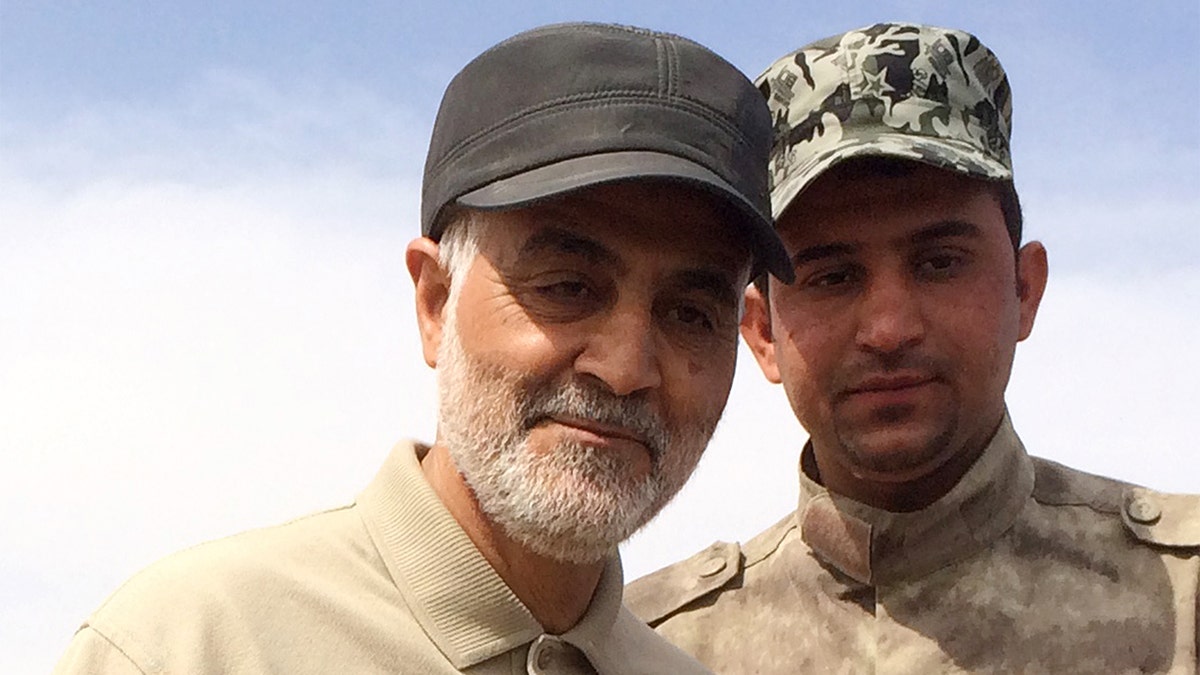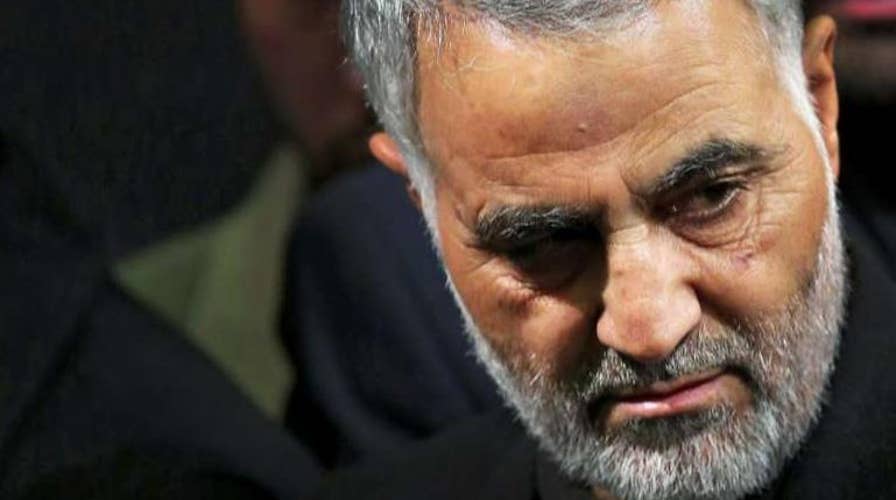Iran Quds Force leader Qassem Soleimani reportedly killed in Baghdad airstrike
Reaction and analysis from House Armed Services Committee member Michael Waltz and 'Fox & Friends' weekend co-host Pete Hegseth.
The elusive Iranian Gen. Qassim Soleimani, head of the Islamic Revolutionary Guard Corps' (IRGC) elite Quds Force, was killed in a U.S.-led airstrike at Baghdad International Airport on Friday, the Pentagon confirmed Thursday.
A military mastermind, Soleimani is suspected of directing a mob of hundreds of Iranian-backed militants to storm the U.S. Embassy in Baghdad this week, triggering a two-day faceoff with American forces at the most heavily fortified U.S. diplomatic mission in the world.
Attackers at the scene spray-painted "Soleimani is our leader" under a broken window at the embassy and displayed flags at the site.
U.S. EMBASSY IN BAGHDAD FIRE DAMAGE SEEN IN NEW PHOTOS FOLLOWING MILITANTS' ATTACK
The Pentagon said in a statement Thursday night that it acted at the direction of President Trump.
"[...The] U.S. military has taken decisive defensive action to protect U.S. personnel abroad by killing [Qassim] Soleimani, the head of the Iranian Revolutionary Guard Corps-Quds Force, a U.S.-designated Foreign Terrorist Organization," the Defense Department (DOD) said. "General Soleimani was actively developing plans to attack American diplomats and service members in Iraq and throughout the region."
Soleimani was the long-running leader of the elite intelligence wing called the Quds Force -- a special forces external arm of the IRGC responsible for supporting terrorist proxies across the Middle East. It reports directly to Iran's Supreme Leader Ali Khamenei and was itself designated a terror group in 2007. The group is estimated to have amassed a militia of 20,000 fighters.
American officials have condemned the Quds Force as being responsible for spreading Iran's Islamic revolution, supporting terrorists, subverting pro-Western governments and waging Iran's foreign wars.
Secretary of State Mike Pompeo had deemed Soleimani equally as dangerous as Islamic State (ISIS) leader Abu Bakr al-Baghdadi, who was similarly killed in a U.S. military raid in October.
Outgoing U.S. Army Chief of Staff Gen. Ray Odierno told Fox News in an exclusive exit interview in 2015: "Qassem Soleimani is the one who has been exporting malign activities throughout the Middle East for some time now. He's absolutely responsible for killing many Americans. In fact, I would say the last two years I was there, the majority of our casualties came from his surrogates, not Sunni or Al Qaeda."
BAGHDAD ROCKET ATTACK KILLS IRANIAN MILITARY LEADERS INCLUDING GEN. QASSIM SOLEIMANI, REPORTS SAY
In April 2019, the State Department announced that Iranian and Iranian-backed forces led by Soleimani were responsible for killing 608 U.S. troops during the Iraq War.
Soleimani, who took over the external operations wing of the IRGC in 1998, was known as one of the most powerful military leaders in the Middle East, and the State Department believes he was the masterminded behind the major military operations, bombings and assassinations that accounted for at least 17 percent of all U.S. personnel deaths in Iraq between 2003 and 2011.
"General Soleimani and his Quds Force were responsible for the deaths of hundreds of American and coalition service members and the wounding of thousands more," the DOD said. "He had orchestrated attacks on coalition bases in Iraq over the last several months -- including the attack on Dec. 27 -- culminating in the death and wounding of additional American and Iraqi personnel. General Soleimani also approved the attacks on the U.S. Embassy in Baghdad that took place this week."
Soleimani was first designated a terrorist and sanctioned by the U.S. in 2005 for his role as a supporter of terrorism. In October 2011, the U.S. Treasury Department tied Soleimani to the failed Iranian plot to assassinate the Saudi ambassador to the United States at a popular restaurant in Washington, D.C.
Considered one of the most powerful men in Iran, he was routinely referred to as the “shadow commander” or “spymaster,” but in recent years had tapped his social media of more than 800,000 followers to post selfies from the battlefields in the region and emerge into the limelight, solidifying his military clout. His Instagram was later banned in April 2019 because of the U.S.' designation of the IRGC as a Foreign Terrorist Organization (FTO).

Iranian Revolutionary Guard Commander Qassem Soleimani (L) stands at the frontline during offensive operations against Islamic State militants in the town of Tal Ksaiba in Salahuddin province March 8, 2015. Picture taken March 8, 2015. REUTERS/Stringer
Soleimani's rise to power and notoriety began in an impoverished farming village in the southeastern province of Kerman, where he was born in 1957.
He became an IRGC fighter at the age of 22 and gained the approval of Ayatollah Khamenei, earning his position as a Revolutionary Guard commander during the Iran-Iraq war between 1980 and 1988.
Soleimani aided Afghan rebels along Iran's eastern frontier who were holding out against the Taliban, and in 1998 later ascended to the most sensitive and esteemed position as the Major-General of the Quds Force.
Under Soleimani’s vision and leadership, analysts say, he carefully purported to carve out a “Shi’a Crescent” in long-held Sunni territory throughout the ISIS battle. The crescent is essentially a land path that runs from Tehran through Baghdad to Damascus and then to Beirut -- where it is considered to be a direct threat on Israel’s doorstep.
CLICK HERE FOR THE FOX NEWS APP
When the Syrian regime, under the rule of President Bashar al-Assad, was defeated in 2012 during the country's Civil War, it was Soleimani who brought in Shiite militiamen from Lebanon, Iraq and Afghanistan to Syria, and then the Russians in 2015, to turn the tide against rebel forces and help Assad recapture key cities and towns.
Beyond militias in Iraq and the pariah government of Syria, Soleimani is considered to be chiefly responsible for propping up proxies ranging from Hezbollah in Lebanon to the Houthis in Yemen and even has a foothold with elements of the Maduro regime in Venezuela.
"This strike was aimed at deterring future Iranian attack plans," the Pentagon added in its statement Thursday. "The United States will continue to take all necessary action to protect our people and our interests wherever they are around the world."
Fox News' Jennifer Griffin, Lucas Tomlinson and Hollie McKay contributed to this report.

